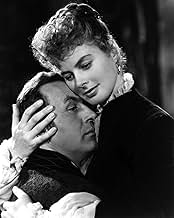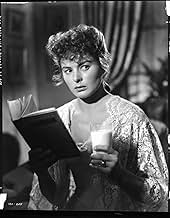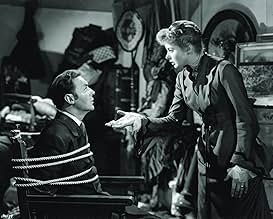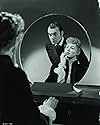Jahre nachdem ihre Tante in ihrem Haus ermordet wurde, zieht eine junge Frau mit ihrem neuen Ehemann wieder in das Haus ein. Der Ehemann hat ein Geheimnis, für dessen Schutz er alles tun wir... Alles lesenJahre nachdem ihre Tante in ihrem Haus ermordet wurde, zieht eine junge Frau mit ihrem neuen Ehemann wieder in das Haus ein. Der Ehemann hat ein Geheimnis, für dessen Schutz er alles tun wird.Jahre nachdem ihre Tante in ihrem Haus ermordet wurde, zieht eine junge Frau mit ihrem neuen Ehemann wieder in das Haus ein. Der Ehemann hat ein Geheimnis, für dessen Schutz er alles tun wird.
- 2 Oscars gewonnen
- 6 Gewinne & 7 Nominierungen insgesamt
- Miss Thwaites
- (as Dame May Whitty)
- Policeman
- (Nicht genannt)
- Young Girl
- (Nicht genannt)
- Cab Man
- (Nicht genannt)
- Pedestrian
- (Nicht genannt)
- Pedestrian
- (Nicht genannt)
Handlung
WUSSTEST DU SCHON:
- WissenswertesWhen this movie was produced, MGM attempted to have all prints of the previous version, Gaslicht (1940), destroyed. These efforts were ultimately unsuccessful, though the movie was rarely seen for the next few decades.
- PatzerWhen Paula finds the letter in her aunt's music score, Gregory crumples up the letter and jams it into his pocket. Later, when she finds the letter in Gregory's desk, it's neatly folded, with no evidence of crumpling.
- Zitate
Paula Alquist Anton: If I were not mad, I could have helped you. Whatever you had done, I could have pitied and protected you. But because I am mad, I hate you. Because I am mad, I have betrayed you. And because I'm mad, I'm rejoicing in my heart, without a shred of pity, without a shred of regret, watching you go with glory in my heart!
- Crazy CreditsThe opening and closing credits are displayed over a background of a burning gaslight. If you look at the shadow on the wallpaper, you see a man strangling a woman.
- Alternative VersionenExists in a computer-colorized version.
- VerbindungenEdited into Hollywood: The Dream Factory (1972)
Indeed, enduring the psychological torture he applied to his love-seeking wife Paula, played by an emotionally versatile Ingrid Bergman, was such an infuriating experience that I left almost one decade between the first and the second viewing, and I literally tiptoed to the DVD to force myself to refresh my memory. After the first fifteen minutes, just when I thought I could stand it, I realized that any horror movie would have been more supportable... or am I overreacting?
I think there must have been some strong reaction toward that novelty of a plot where a person drove another one insane through mental manipulation to the point that "gas light" became part of common language... that's how impactful it was. Not many movies deal with that particular device, but this is how "Gaslight" was revolutionary and sophisticated in a twisted way, suiting the emerging noir genre.
The "gas light" effect referring to the dimming of the light that made Paula believe she was going crazy isn't effective on a narrative level because it's driven by a fact but rather by the seeds of doubt it sows on her mind. We know for a fact that a woman is being manipulated but only suspicion can heal her from her husband's cruel dominance.But she can't suspect him because she loves him in a way that echoes Stockholm Syndrome and he's a Machiavellian gourmet who knows exactly the amount of cruelty and suavity to apply.
Charles Boyer's with all these cunning eyes, that mouth always wary about not letting a word slip, and his faux-affable "French lover" manners, elevate his characters to summits of vileness and gaining extra altitude by a symmetric effect with Ingrid Bergman who brings an extraordinary level of pathos while maintaining a strange aura of dignity. This is a woman whose heart and mind are slowly shred to pieces but she's resigned to believe any word of her beloved husband because she can envision anything except such capability of vileness.
Why would the gaslight dim every night? Why would she hear noises the servant doesn't notice and why would Gregory be wrong if the second maid wasn't so arrogant and defiant? Even Angela Lansbury in her screen debut is perfect in the role of Nancy, the street smart and slightly slutty maid whose deadpan and snarky attitude is more affecting than any hint of false empathy or true detachment. This is a free-spirited woman yet manipulated by the way Gregory exploits every element of the environment and every possible situation. So what we have is a conspiracy perfectly oiled where Cukor makes us witness the action while making us as powerless as Paula. We're like passive observers bound and gagged and undergoing the villain's sadism. In a way, if we consider anger as a brief madness, we're also being "gaslighted" by Cukor.
The mark of great films is to elicit strong responses; and watching "Gaslight" a second time reminded me of something I meant as a compliment after my initial viewing, I thought it was the most Hitchcockian non-Hitchcock film... and the presence of Dame May Whitty or Joseph Cotten play like interesting nods to "The Lady Vanishes" and "Shadow of a Doubt". In"Vanishes", the main protagonist was toyed with her own certitudes and lured into doubting her own sanity and "Shadow" is about a villain who's a close parent. "Gaslight" makes these two plot points converge beautifully but there is another Hitchcock classic it bears a kinship with: "Suspicion".
And I think I can now be more explicit about what bothered me with "Suspicion" and that makes "Gaslight" a superior movie. In "Suspicion", the husband's guilt was the central theme but worked as a double edged word, if he was guilty, then he left too many hints to be a believable villain, if he wasn't, it was anticlimactic. In "Gaslight", we know the villain from the start and we know he's good at hiding his vileness (the essence of 'gaslighting') and the frustration doesn't come from the act but the lack of suspicion, the point is the psychological struggle within a woman whose passion blinds her mind and endangers it, a woman who trades her self-esteem for the sake of the most harmful person she could ever meet.
"Gaslight" foreshadowed, no pun intended, the way film noir would dominate post-war cinema, at a time where many people were blinded by patriotism and driven to real madness by leaders who had contempt for them. "Gaslight" is also a marvel of film noir in its use of the nightmarish fog of London Victorian streets used as the perfect camouflage for a Jekyll/Hyde villain, and where d the walls of respectability of an ordinary house, hid the claustrophobic nightmare of a woman lost among so many useless items and trophies, being the most precious one of all... or the most disposable.
Boyer, Lansbury were all Oscar-nominated, but it was Bergman who won the first of her three Oscars and deservedly so. In what could have been a one-note performance she explores every possible shade of fragility, doubt and panic, disbelief and resignation, whiplash moods orchestrated by her evil husband until her shining moment at the end, perhaps one of the most satisfying cinematic rants, when the whole scheme of Gregory backfires in the most delightful way.
But I still wonder why he wasn't listed in AFI's Top 50 villains, the film made the "thrills" list but hey, who made the thrills?
- ElMaruecan82
- 14. Aug. 2018
- Permalink
Top-Auswahl
- How long is Gaslight?Powered by Alexa
Details
Box Office
- Weltweiter Bruttoertrag
- 2.391 $
- Laufzeit1 Stunde 54 Minuten
- Farbe
- Seitenverhältnis
- 1.37 : 1
Zu dieser Seite beitragen




































